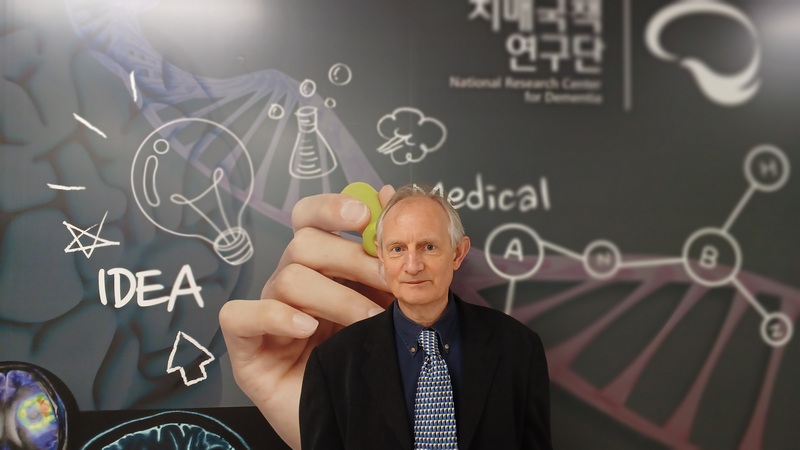Windmills, Tulips, and Kimchi: A Dutch intelligence researcher studies Alzheimer’s disease in Gwangju
Interview with Dr. Jan te Nijenhuis
William Urbanski: Thanks for taking the time to do this interview! As the only Dutch academic researcher in Gwangju, could you please tell the readers a little bit about your academic and professional background? Besides a long list of academic achievements, you have also been heavily involved in industry, correct?
Jan te Nijenhuis: First of all, thank you for doing this interview with me. It is always an honor to be interviewed because it shows that people are interested in your work. It is great to be in Gwangju. I studied at the University of Groningen, a beautiful, old medieval city in the north of the Netherlands. I had two specializations: personality psychology and industrial and organizational psychology. Every human being is unique – even twins – and personality psychology supplies the terminology to describe this uniqueness.
I/O psychology is about running organizations well, and I specialized in personnel selection: You have ten applicants for a position, and how do you choose the one that will perform the best quality of work for the organization, so that the profit will be highest and the person is most satisfied in his work? Scores on IQ tests do the best job. So, both in my theoretical studies and my applied studies in psychology, the IQ test was the most important.
I have always been interested in combining theoretical research and applied research, and I have always had a strong focus on IQ testing. I worked for the Dutch government, namely Dutch Railways, and the Royal Dutch Armed Forces, which included a large project for the Royal Dutch Military Police, and I did a lot of consultancy work in industry, including the National Dutch IQ Test on TV and making an IQ test in the form of a video game. The interesting thing about intelligence is that it is linked to thousands of important phenomena, so you can do research on many topics, which I did. A specialty of mine is taking existing datasets from applied research and testing fundamental theories on them; that way, I do not have to spend enormous amounts of time collecting research data.
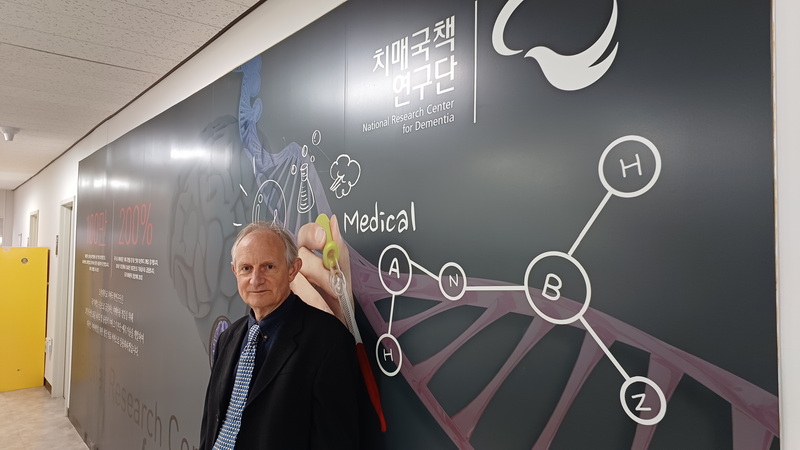
I have won several prizes for my research. I collaborated with people from around the world, so I have more than 200 different co-authors. I have many successful collaborations with Northeast Asians: Koreans, Chinese, and Japanese; it is a winning combination for me!
William Urbanski: Around 2013 you achieved a level of fame and notoriety worldwide thanks to an academic paper you wrote about (and I am paraphrasing here) the general decline in people’s intelligence since the Victorian era. Could you tell us about that?
Jan te Nijenhuis: I am very proud of that paper. It resulted in hundreds of thousands of tweets and hundreds of thousands of reactions on the internet and extensive coverage in newspapers, weeklies, TV, and radio. I was interviewed for Dutch, French, German, and US TV.
What is the background? Before 1800, life was harsh, and rich people had twice the number of surviving children than poor people. Many times, half the children would die, whereas the percentage is now smaller than one. It was brutal. But after 1800, the Industrial Revolution brought wealth, and higher-educated people had slightly fewer children than lower-educated people. Because intelligence is highly heritable, the higher-IQ parents could pass on their genes for higher intelligence to fewer children, and the lower-IQ parents could pass on their genes for lower intelligence to more children. The effects are very small: only one IQ point per ten years. But we proved that it adds up: Over a period of one century and a half, the mean intelligence in the Western world declined by 14 points, which is a gigantic effect.
Having a good number of highly intelligent people is crucial for society. Scientists have to be very clever, and the top people in business also have to have very high IQs; it is very difficult to be a successful businessman. With the mean intelligence strongly declining, the percentage of very clever people dramatically decreases. You would predict that people now would have produced far fewer important inventions than our forefathers, which is exactly what happened. Correcting for the fact that we now have much bigger populations, we only have 15 percent of the big discoveries of the Victorians.
Our brains are less good at processing information than 150 years ago. We still build upon the legacy of fantastic inventions made by the very clever Victorians.
William Urbanski: I definitely agree that people’s intelligence is getting lower, so it is nice to see that theory backed up with evidence. In your study, you looked at the correlation between reaction times and IQ. Could you explain how that works?
Jan te Nijenhuis: Intelligence is about your brain processing information. Clever people process that information quickly, and dull people process that information slowly. Many people are familiar with classical IQ tests, for instance, for determining which school type is best for them or for entrance into the Armed Forces. In some IQ tests, you have to work with words, for instance, how many difficult words do you know? Or you are tested about the breadth of your general knowledge; for instance, which Korean admiral scored victories against the Japanese navy in the Imjin War? Or you have to play with numbers: How much is 327 times 16? Or you have to rotate figures in space. By the way, Koreans are the best in the world with spatial rotation! Then you add up the scores on all the tasks, and you have an overall IQ score, indicating a general ability to solve problems.
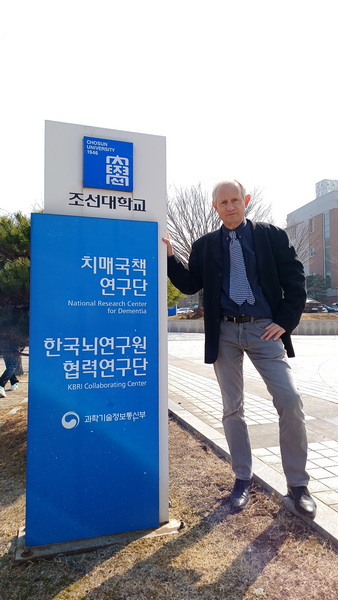
However, there is an older tradition from the nineteenth century to measure how well your brain processes extremely simple information, the so-called simple reaction time. For example, a light comes on, and you have to push a button as quickly as you can. This takes you less than one second, and people with a good brain do this much faster than people with a less good brain. Like with traditional IQ tests, there are also all kinds of simple reaction time tests. When you combine ten different simple reaction time tests, you get a score of general simple reaction time. And several studies have shown that the total score on an IQ test and the total score of simple reaction times hang together perfectly – they measure the same thing: the brain’s ability to process information.
So, in our 2013 study, we used old reaction time measures from the 1880s devised by Francis Galton, the brilliant cousin of Charles Darwin. Our study was very technical and required expertise in very different fields, but it was scrutinized by experts and got published in a top journal.
William Urbanski: How did it come about that you came to Chosun University as a full-time researcher? I understand that before attaining your current position, you had a couple of shorter stays in the city.
Jan te Nijenhuis: How did I end up more than 10,000 kilometers from home? That is an interesting story. To make some extra money, I also work as a science writer, often interviewing scientists whose work I enjoy reading. In 2006, I was asked to interview a certain Dr. Kun Ho Lee, a brain researcher who found some brain areas that were strongly linked to scores on IQ tests. The study was published in a top journal, and I was impressed, so I interviewed him by email. After the interview, we kept in contact by email, and we published several papers together, often based on Korean data. We met for the first time at a conference in Madrid, Spain, where I also met his wife and young daughter, and later he spent a day with me in Amsterdam, where we made a tour by boat through the canals. In 2013, he emailed me: “Jan, I received a grant of 50 million euros, and I can build my own research center on Alzheimer’s research.” I was happy my Korean friend was so successful. In 2015, he invited me to give a lecture on my research at Chosun University. On my first trip to Korea, for one week, I was treated like a king, with a stay in a five-star hotel and fantastic dinners, and at the end was invited to come work in Gwangju. After that, I worked in Korea three times, but always for only short stints of two months. In 2019, I started working on longer contracts, and I now even have an Indian post-doc working with me.
William Urbanski: Coming to Korea as a Westerner always poses cultural and linguistic hurdles. From a research perspective, could you talk about the specific challenges you face in Gwangju and at Chosun University? Maybe you could tell us some of the positive aspects as well?
Jan te Nijenhuis: It is really a pleasure working in Gwangju. The Koreans have the highest mean IQ score in the world: 107. The people are superbly trained, work very hard, and they always help me if information is only available in Hangul. Also, the undergraduate students all want to be the best in the class; this is very different from many Amsterdam students that try to get away with the least amount of work possible and do not mind producing sloppy work.
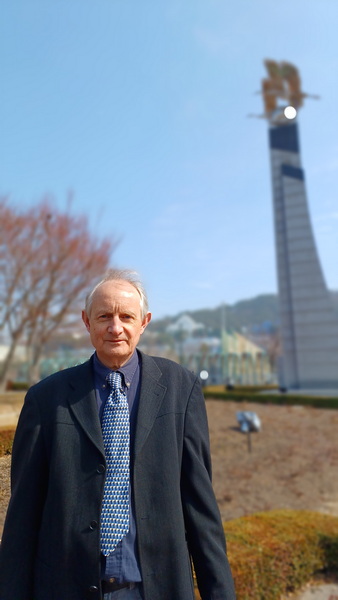
The Dutch are very individualistic, but the Koreans do everything in groups. Even the students on campus often walk in groups, at a small distance from each other. I once had a technical question for my colleague on whether I could take a statistical shortcut that would save me two hours of work. Then we had a group discussion with five people that took two hours. So, ten man-hours of work to save me two hours of statistical computations! But, at least there was consensus!
I am ashamed to say that after all these years, I still speak almost no Korean. I was raised bilingually, and I am a polyglot busy learning my seventh language, namely Portuguese, which takes up quite a bit of my free time. Adding language number eight is a bit of a time challenge. I want to learn more about Korean culture, and speaking the language is essential.
William Urbanski: At Chosun University, you are researching certain aspects of Alzheimer’s disease. Please tell the readers how this connects to your field of expertise in theoretical and applied psychology.
Jan te Nijenhuis: Alzheimer’s is a nasty brain disease. The nerves in the brain are slowly rotting away until they die. It becomes increasingly difficult for the brain cells to communicate with each other, so the processing of information by the brain slows down dramatically. This means the scores on IQ tests get lower and lower, and even the simplest tasks previously become too difficult.
Well, I do not have a background in medical biology, but I know a lot about intelligence and especially how to test it. I worked a lot in personnel selection, where the IQ test is the best instrument to help you select who will be the best worker for a company. I also worked a lot on the development of new intelligence tests. I now apply these skills to intelligence-related topics in biomedical research. For instance, a hot research topic is finding the areas of DNA that are responsible for IQ scores. My Korean colleagues have IQ scores of the Gwangju elderly, and also DNA scans at the level of the smallest units, the so-called single nucleotide polymorphisms, or SNPs for short. I work on several projects where I try to find the SNPs for intelligence using specialized techniques from theoretical intelligence research.
These are always collaborations; I know a lot about intelligence testing, and my Korean colleagues know a lot about medical biology and SNPs. It is specialized work, and I am learning something new daily. The switch from personnel selection at the Dutch Armed Forces to Alzheimer’s research at Chosun University may seem drastic, but for me, it works well. It is all about intelligence.
William Urbanski: Where are you getting the data for your current research?
Jan te Nijenhuis: My Korean colleagues have built a fantastic database with everything that predicts the onset of Alzheimer’s disease: genes, brain scans, blood scans, brain fluids, history of illnesses, and intelligence scores. All the data come from the elderly in Gwangju and its surroundings. There are now more than 10,000 included in the database. Most of them have no signs of cognitive illness; there is a group with mild cognitive impairment, and the smallest group consists of people with varying severity of Alzheimer’s disease. There is a whole team of qualified people collecting the data here in Gwangju. Some of the elderly also participate because they get free medical check-ups. Collecting all the information costs a pretty penny, but the elderly pay nothing.
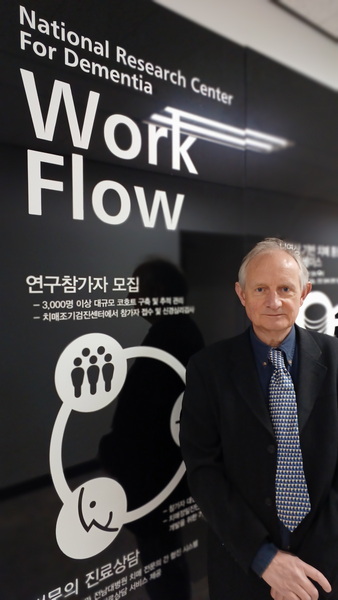
This unique database is used for collaborations with researchers from all over the world. For instance, some of the DNA samples are now scanned in the USA with the most powerful scanners in the world, so that we will have information on 100 percent of the DNA. But I must say that notwithstanding the billions invested in Alzheimer’s research, it is still a mysterious disease.
William Urbanski: To conclude, what are the biggest positives about living in Gwangju and being a researcher at Chosun University?
Jan te Nijenhuis: On the weekends, I take long walks around Mudeung-san; we have no mountains in my country, so this is all new to me. The trips help me to remain relaxed, physically fit, and creative, which is important for a researcher. It happens often to me that when I take a short break, people want to have a chat with me and offer me all kinds of food. The Gwangju people are amazingly friendly.
I very much enjoy Korean food – all the banchan (반찬, side dishes) make every meal feel luxurious. In Korea, I got into the habit of eating fermented food at every meal. Very good for the bacteria in your gut, which help you stave off infections. But I miss goat cheese, herring, sardines in olive oil, and one-liter buckets of ten-percent-fat Greek yogurt!
I think it is good for the Korean research culture to have contacts with researchers from countries with much longer research traditions. I have already set up all kinds of collaborations with Western researchers, analyzing the data in the big Gwangju Alzheimer database. I hope that in the near future, I will not be the only Western researcher on campus!
The Interviewer
William James Urbanski is the managing editor of the Gwangju News.







